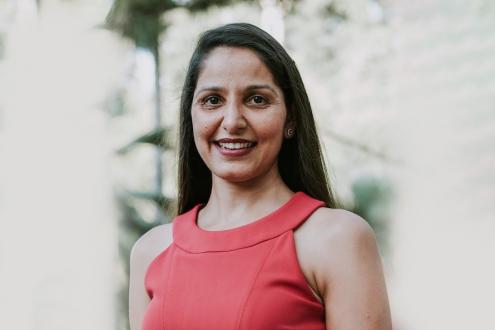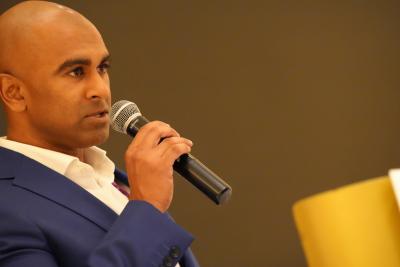Propine’s CEO & Co-founder Extols the Virtues of a Well-Regulated Universe of Digital Assets

Jan 18, 2023
Established in 2018, Propine is the first independent digital asset custodian licensed by the Monetary Authority of Singapore (MAS), promoting its bespoke institutional solutions as being ‘at the forefront of innovation amidst the paradigm shift that is surging through global financial systems architecture’. Hubbis recently interviewed Tuhina Singh, CEO and co-founder, to find out what progress Propine has been making in the expanding universe of digital assets. She explains that a ‘virtual’ future is no longer in doubt, it is only now a question of choosing the right paths, and the right partners with which to work. The future of digital assets is assured, she states, and regulation is emerging and consolidating to help ensure a safer ride ahead for all.
Created, in 2018, Propine was admitted into the MAS FinTech Regulatory Sandbox and granted a conditional license in November 2019. The company successfully exited from the Sandbox in Jan 2021 with a Capital Market Services license, to provide custody services for digital assets.
Since then, Propine has substantially increased its support base, assembling an impressive array of investors, including SGInnovate, Seeds Capital by Enterprise Singapore, Woodstock Fund, Lunex, Endeavour Ventures, BTC Inc., Wave Financial and Angel Central amongst others.
“Propine is committed to bridging the gap between traditional and decentralised finance,” Singh reports. “Our one stop solution caters to all digital asset custody needs including digital securities, cryptocurrencies, stable coins, NFTs and fiat on a single integrated platform called Protect. We also provide end-to-end securities services, from tokenisation to asset servicing and post-trade activities.”
Built with solid foundations
She says that armed with an ISO 27001 and SOC 2 Type 2 certification, Propine has built compliant solutions, which allow institutions to easily participate in the space without any worry about the technology, security or regulations.
“We are institutional grade and ideally placed for the increasing institutional adoption of both cryptocurrency and digital securities,” she says.
“PwC acts as our governance and risk control auditor. Baker Tilly acts as our regulatory and financial auditor. In short, there is no part of our business that is not looked at by external parties. Everything is in place.”
She reports that Propine today has its HQ in Singapore and has specialist team members dotted around the world in places such as India, Vietnam, Malaysia, Hong Kong, in Eastern Europe, and two countries in Africa. “We are roughly 50-strong today but growing very rapidly and we aim to get to about 100 people, and really the only thing hindering our expansion is finding the right talent,” she states.
Making digital asset custody plausible
Singh then elaborates on their custody proposition, noting that just as in traditional finance, the custodian and other services around that are handled in the background. “We are building for a vision of the future when everything that we look at in this world is going to get digitised and tokenised in some format, even your identity,” she states. “And if everything is tokenised, safety and security must be assured, and cyber-security and protection of the digital wallets are therefore central to our offering.”
She explains that as an MAS-regulated entity, the service quality is remarkably high and there is legal recourse for customers. “And we cover the entire spectrum of digital assets, which I can describe as representations of value in a digitised format, and specifically verified on a distributed ledger of some kind, both permissionless and also limited by permission.”
Covering all the angles
And she explains that from a regulatory point of view, there are generally speaking two major classes of digital assets, that can then be further split into subclasses. One type are securities which are regulated across jurisdictions under some kind of a Securities Act. “These are typically what we call traditional forms of securities or structured products that are then tokenised and put onto the blockchain,” she reports.
And the second type of digital assets are the non-securities. These ‘non-securities’ could be a representation of property, for example a Non-Fungible Token (NFT) representing real estate, or a collectible watch. These could be in the form of a bearer token or a registered token, or there might be a utility token, which only represents a right to use a certain product or service in the future.
“The beauty of digital assets is the fact that it has provided a way to represent all kinds of different value onto the blockchain and to be able to distribute that value,” she elucidates.
Join the wave
Singh moves away from the detail to highlight the implications and the attractions for the wealth management community.
“For any customer with a Propine account, they can buy all kinds of digital assets through us in a completely compliant manner,” she reports. “We handle the KYC, the KYC on the blockchain, we make sure that all the global compliance rules are followed correctly.”
Secondly, Propine helps with staking, meaning that once customers acquire certain coins, and would like to earn passive income through staking on the respective blockchains, Propine is enabling those solutions as well. “Or if you are a little bit more progressive, perhaps you are looking to get into the DeFi space, then we can offer a regulated access to the DeFi system. Today the DeFi applications (Dapps) are created only with retail customer in mind. Just a username and password provdes access to the dapp functionality. For an institution with robust risk management systems, this is a non-starter. They need appropriate access management, risk management and governance systems in place to be able to safely explore the opportunities in DeFi space. That’s a layer that Propine is able to provide atop the DeFi access so a family office or asset manager for example can thereby gain secure access to DeFi.”
A third key element of the proposition is accounting and reporting. “For digital assets, this is far from straightforward, but we make life easy by providing the right type of reports, providing details about the transactions and the cost basis and prices. We focus a lot of investment and time on reporting for fund administrators, accountants and auditors to do their jobs correctly.”
Institutional quality
She explains that a family office that wants to create liquidity from certain assets that are suitable for tokenisation, Propine is also there to help that entire process, to ensure tokenisation, distribution and storage of such assets is of institutional quality.
Singh says that well before the FTX crisis, it was very important to understand the ecosystem and who is what amongst the service providers. “We tick all the boxes, but anyone serious about getting into digital assets should do their homework, understand what they need to know and ask the right questions,” she says. “And regulation is of paramount importance, customers should avoid unregulated players in any segment, including DeFi, where many services are today being offered by unregulated players.”
Understanding the landscape
Finally, she says clients need to read the small print – for example some supposedly robust custody providers have fine print that allows them to use the digital assets over which they provide custody as they wish.
“And that creates exposure to a whole set of unintended market and unintended credit party risks,” she cautions. “We have seen these types of issues arise with Terra Luna, Celsius, Three Arrows Capital, and so forth. You don’t want to find out the hard way that you have been keeping assets with a certain platform and they are then loaned out and you send up as an unsecured creditor to you or to one of the parties that you've been working with.”
She says these are the types of hidden risks that are not necessarily talked about. “But when you work with a licensed player, when you work with a good party, then these types of risks are already talked about, you're obligated to disclose these things, it must all be very clearly mentioned in the legal frameworks.”
Additionally, and its important to distinguish this - never leave your assets with a company operating with a money transmitter license. Period. Money transmitter license provides no investor protection around how the customer assets are used by the company. Hence, we don't really know what they are doing with customer assets on their balance sheets. And when regulations don't prevent people from doing unacceptable things with other peoples' money, greed almost always prevails. Assets can only be held by a Qualified Custodian, off balance sheet, else we'll continue to see carnage and losses.
The what ifs…
She ponders: “What if things go wrong, because at the end of the day, everything is still fairly new, the infrastructure is still far from being mature compared to other asset classes. Do you have legal recourse? What is the fallback? Is there insurance in place? Are you really the ultimate beneficial owner of the tokens? In short, customers must be questioning and circumspect.”
Key Priorities
Singh’s first big priority is to make sure their existing suite of products and services are well honed, work smoothly and are scalable. The second priority is geographical expansion, firstly to the Middle East, and later into the Americas, where they are currently starting to forge partnerships. The third priority would be promoting their name and their services more robustly.”
The evolving world of regulation
Singh also offers her two-minute guide to regulatory evolution. “First, this is a space that is going to get only more regulated and not less. Second, all jurisdictions are moving at their own pace, but the momentum is global, and there is greater urgency than ever before, with a larger urgency to achieve more universal guidance or rules around how this digital class should be regulated. Greater definition around what these assets are and how they should be regulated is incredibly welcome, and it is coming.”
She adds that she is a believer that DeFi can be regulated, and will be, although many argue the opposite case. “DeFi, which is decentralised of course, will in my view be regulated, but in forms that people do not understand unless you are part of a regulated industry. Japan has already come out with its new regulations around stable coins. Singapore, the US and the UK have already come out with guidance around how they think they should be regulating stable coins and very soon it is going to become norm.”
No virtual stone to be left unturned
She adds that we have seen Tornado crash, becoming the first software to ever go on to the sanctioned list, creating major waves. “And we have seen decentralised autonomous organisations, which are basically smart contracts on a blockchain being recognised as a legal entity, which means that space is going to get more and more regulated.”
This, she states, will help to weed out scams, and it's going to help the infrastructure players become more serious, which will allow a safer space for innovation to happen and a safer space in which consumers can participate.
Hardliners soften their views
She also notes that some major jurisdictions like China, India, who have traditionally taken a hard-line stance, are softening. For example, she notes that China has actually included NFT and blockchain in its next five-year plan. There are also very aggressive regulations in Hong Kong, which embraces retail into crypto. India is also now past the whole ‘ban-the-crypto’ stage and they are now, for example, piloting digital Rupees.
And in the developed markets, larger institutions, whether State Street, Bank of New York Mellon, Standard Chartered, Citibank, JP Morgan, and others are getting ready for the digital assets revolution.
Not if, but how
“Last year, I participated in the World Economic Forum, and it had every single financial institution you can name there, and the agenda was not ‘Are digital assets here to stay?’, so this time it was far more about how to navigate this entirely inevitable future, and the debate is really around what different paths can different institutions take to ride the mounting wave.”
The future is coming
Her final observations centre on the ‘why’ of digital assets. “We are on a path for our entire world to be tokenised, we are transitioning to a digital virtual world,” she states. “In the web2 world, information transmits over internet and value transfers over swift network. In web3, for the very first time “value” and “information” will be relayed through the same pipe.. This is going to completely transform business models in ways that we can't even begin to predict today.”
“Today, the crypto world seems very dark. Fear, Uncertainty and Doom ("FUD") rule the land, influencing the risk appetite of all.
In 2008 we saw FUD with the collapse of mortgage-backed markets. But that did not mean real estate was going away or that it wasn't worth anything. Houses and condo's were being sold off for literally less than the cost of materials. But FUD had banks, investors and regulators in a panic.
In 2001 we saw the dot-com bubble burst, causing the collapse of the internet sector. Everyone was terrified. Did this mean the internet was done and that it wouldn't change the world?
Similarly at the start of 2023 FUD is distorting decision making in digital assets space. But smart people will reap enormous gains, as they did in 2008 and 2001.”
She also acknowledges we are at a very early stage. “It is early days indeed, but business models are going to change, the way people interact is going to change, the way people consume services are going to completely alter,” she says. “What we're doing today is really laying basic infrastructure for the future. And as to the wealth management community, do not wait because anybody who doesn't have a digital asset strategy is not going to be part of the future that is already on its way. FUD=Opportunity. As the saying goes, "buy straw hats in winter".
Getting Personal with Tuhina Singh
Singh hails from India, the daughter of a military father who moved location roughly every two years. “And today, little surprise that I am a global nomad, not tied to any place,” she says. “Wherever opportunity in life takes me, I flow with it.”
After studying computer engineering at BITS Pilani, she began her career in Computer Science Engineering, working, she recalls, on the first Nokia camera phone many years ago. “I am an older geek,” she quips jovially.
She then obtained an MBA from the Indian Institute of Management in Lucknow, and won an internship at Citibank, immediately loving the excitement and energy of FX trading, moving then to BNP Paribas as an FX options trader. “I then moved on to private banking with IndusInd Bank, where I set up the derivatives trading desk for both FX and fixed income derivatives from scratch, which was a fascinating time,” she reports.
She later took a break from the cut and thrust of financial markets and learned new software and coding skills such as Python, and it was at the same time she stumbled across Bitcoin in its very early days.
“In 2011, I thought it was a complete scam, but in 2015, thanks to a book titled “Mastering Bitcoin: Unlocking Digital Cryptocurrencies” by Anthony Antonopoulos, I started getting my hands dirty. I coded up a rudimentary blockchain explorer, and a rudimentary bitcoin wallet, it was then I realised the depth of the stack, and saw all the implications, or at least some,” she explains. “That was when I realised the path led to disruption of capital markets and I wanted to become part of this fabulous new ecosystem.”
She recalls that she became involved in the early days of ICO issuance, but was quickly disillusioned with their lack of standards, and she then saw the germ of an idea for Propine. “I realised that for this asset class actually to reach its potential, it has to be built upon regulated infrastructure, and although that was against the grain at the time, which is how Propine was born,” she reports.
Married with one son of seven years old, Singh is a dedicated mother to both Propine and her child. She loves cooking at home, and running and swimming to keep fit, to reduce stress and burn the calories.
She also says that her own issues with stress management had led her also to value reflection, meditation and control of the mind. “Being able to ground myself is a true source of comfort and also my energy,” she says

CEO & Co-Founder at Propine
More from Tuhina Singh, Propine
Latest Articles






